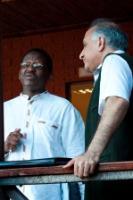
Calling for a modest approach to addressing the challenges of education in South Africa, Rhodes University Vice-Chancellor, Dr Saleem Badat and Deputy Vice-Chancellor, Dr Sizwe Mabizela presented their critiques of the recently proposed Green Paper on Post-School Education and Training at a Rhodes’ ‘Education Dialogue’ session held recently.
According to Dr Badat, there is actually not too much one can say in response at this moment because the document is big on vision and extremely short on details.
“How the priorities will be established will be interesting and critical. Formulating priorities can be a very difficult issue as it sometimes requires one to choose between dearly held goals and presents social and political dilemmas’,” he said.
The Green Paper seeks to hold together equity and quality, undergraduate and postgraduate, teaching-learning and research.
“Of course, this is much easier said than done… We have to await the details, to hear how the Department of Higher Education and Training proposes to mediate key paradoxes, potentially competing goals and the like before we can really comment.
“I am encouraged by how the Green Paper seeks to very soberly balance the issue of producing more PhDs,” added Dr Badat.
Dr Badat also emphasized that being a Green Paper on post-school education and training rather than just post-secondary education and training, and given the state of schooling and drop-outs from schooling, means that a very large domain is being conceptualised, structured and articulated.
“In as much as it is good to be ambitious, it also important to set the limits on what one can try to achieve.”
Dr Mabizela noted how the Green Paper does not sufficiently engage with schooling and emphasized the attention he would like to see paid to the FET sector.
According to Dr Mabizela, FET colleges aren’t currently seen as institutions of choice – the result he believes of unclear matriculation results classifications.
“There are many students who just follow what their matriculation classifications say and don’t know that just because they got a university pass doesn’t mean they can’t explore studies at an FET,” he said.
Professor Sioux McKenna, Higher Education Studies Doctoral Coordinator in the Rhodes Centre for Higher Education Research, Teaching and Learning (CHERTL) said the Green Paper was ambitious and rightly turned the spotlight onto the FET sector.
“It is this sector which is probably most needed to attend to the frequent demands for skills development,” she said. “I think the inevitable growth in private FET and HE institutions is going to be something to watch. We cannot meet the current educational demand without increases in the private provision of education.
“I think we should be engaging with this sector and determining a shared belief as to what is at the heart of quality education so that we can ensure this is present in all institutions of learning, regardless of whether they have a profit-motive or not,” she added.
The Green Paper, which is open for comment until 30 April 2012, presents a broad-ranging plan to restructure the post-school sector in a bid to address the problems of lack of opportunity for school-leavers, a troubled FET sector and the part played by the sector in the ongoing reproduction of gender, class and racial divisions.
The paper presents a plan for a differentiated but articulated post-school sector with direct links to the country's development agenda.
These plans include an increase in university intake from the current 900 000 students to 1 500 000 by 2030, and to have an enrolment of 4 million students in colleges and other post-school institutions; the nature of these institutions, some of which are not yet in existence, is described in the paper.
By Sarah-Jane Bradfield
Photo: from l-r: Deputy Vice-Chancellor, Dr Sizwe Mabizela and Vice-Chancellor, Dr Saleem Badat
Photo by: Ettione Ferreira
